My China Story | Art Connecting China, France
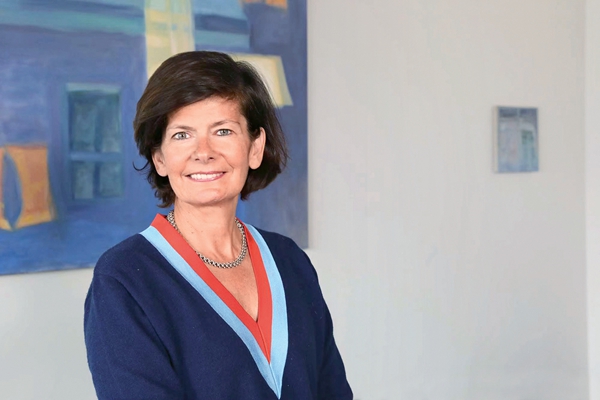
Christine Cayol, a French writer and philosopher, has lived in Beijing for two decades. During that time, she has embraced the Chinese way of life — and the profound Chinese culture. Also during that time, she has emerged as a cultural-bridge builder, who has promoted cultural exchanges between China and France. In 2013, Cayol received the Legion of Honor at the French Embassy in Beijing. The award recognized Cayol for her exceptional contributions to China-France cultural exchanges.
Cayol performs multiple roles. As vice-president of the Sino-French Cultural Forum, she is committed to establishing a high-level platform for dialogue and cultural and artistic exchanges between China and France.
Cayol is also founder of the art space, Yishu 8, a home for Chinese-French art in Beijing. Yishu 8 supports young artists, from both countries, with their residencies and studies in Beijing. She also had her hand in the establishment of the French Young Artist Award, Chinese Young Artist Award, and Sino-French craft-exchange program.
Furthermore, she is an accomplished writer, who introduces the lives and thinking of Chinese to her French readers. Cayol has written several books considered to be cultural bridges between French and Chinese people. In one book, Why Chinese People Have Time, she shares her observations and reflections on Chinese people's wisdom of dealing with time.
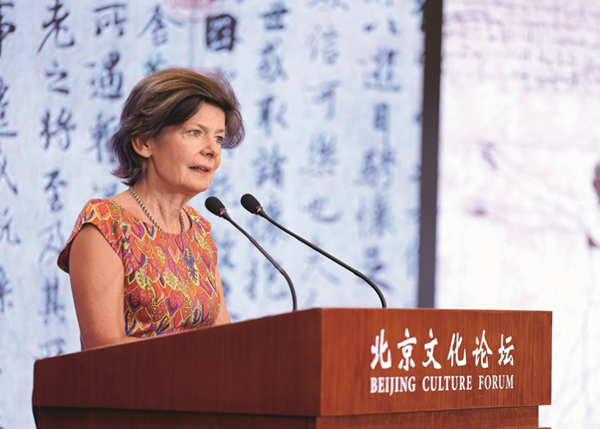
Predestined
Cayol's initial encounter with Beijing was in 2002. Back then, Cayol had not studied Chinese, nor did she know much about China. However, as her fiance had relocated to China for work, Cayol gradually developed an interest in China. She eventually visited Beijing. The experience was a major turning point in her life; she was taken with the country, and in 2004 she decided to make her home in China. Cayol and her fiance eventually wed in China, and they moved into a hutong in Beijing.
The day after she arrived in Beijing, while out for a walk, Cayol saw people walking their birds, sunbathing in a hutong, and dancing and practicing tai chi in the park. Based on what she witnessed, Cayol decided life in Beijing was relaxing and interesting, which was a new experience for her.
"Beijing people are very good at enjoying life and having fun. I felt, at that time, living in this city, and the country, would help me gain a lot and even fulfill my dreams," Cayol says.
Her experiences in China were nothing like the descriptions she had heard before her arrival. "You should always go and see what is happening in reality. If you want to talk about China, then go to China," she says.
After she relocated to China, Cayol began studying Mandarin, in Beijing, and began deepening her understanding of China's traditional culture and modern development.
During her time in Beijing, Cayol has come to the conclusion Chinese art is not only about the colors and the lines on the canvas, but also a way of life — and a kind of cultural inheritance. She is especially attracted by the beauty of Chinese calligraphy, and by the profound connotation of tea culture.
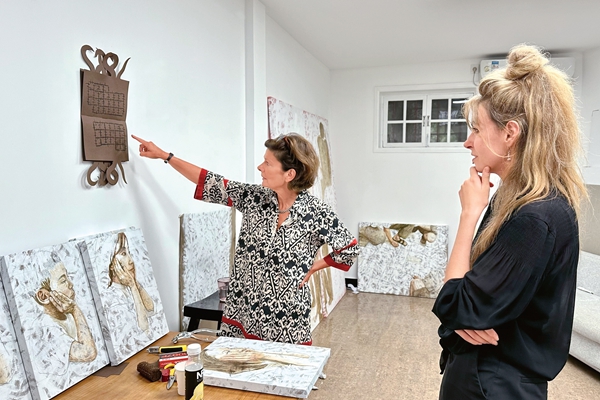
Forging Friendship, Through Art
"As a French national, who has been living in China for a long time, I am lucky to have had the opportunity to experience Chinese culture up close. I hope to bring this experience to more young Chinese and French artists," Cayol says.
In 2009, Cayol founded Yishu 8, based in both Beijing and Paris, to foster cultural exchanges between French and Chinese artists. In 2011, Yishu 8 in Beijing moved to the former location of the Sino-French University, just southeast of the Forbidden City.
More than 100 years ago, the university fostered cultural exchanges between China and France. Fast forward a century, Yishu 8 continues that legacy, on the university's original site.
The Yishu 8 initiative provides award-winning artists from France the opportunity to reside in Beijing, and award-winning artists from China the opportunity to reside in Paris. Furthermore, the initiative provides the artists with a platform, on which to draw inspiration from the local artistic milieu, and the ability to immerse themselves in the cultural lifestyle of the host country.
"Yishu 8 is different from other art galleries, museums or art institutions. It is like a family house, where artists from China, France and other countries are welcomed. Artists meet here, and cultures collide here," Cayol says.
"I think art is a common language for all human beings. We have forged friendships, through art. These are friendships between artists, but also friendships between Chinese and Western civilizations. It's a courier of peace, harmony and the future," she adds.
The fifth Sino-French Cultural Forum was held from November 12-15, 2023, in Suzhou, in east China's Jiangsu Province. It was co-organized by Yishu 8.
"Yishu 8's exchange programs are long-term and sustained, whereas the forum, spanning just two or three days, can involve a broader audience. It has the potential to ignite numerous collaborative inspirations, and also facilitate substantial cooperation, within a short period," Cayol says.
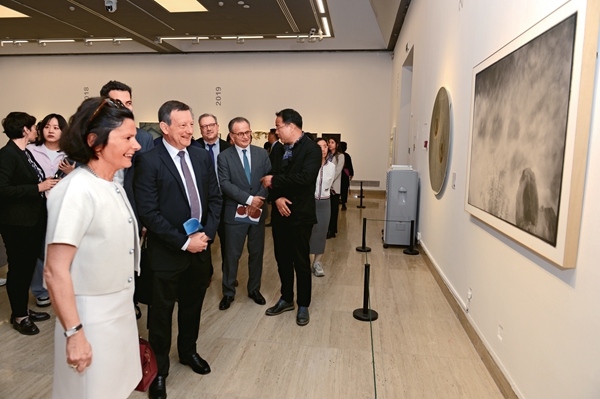
Tea and Wine
Cayol believes the cultures of China and France are akin to tea and wine, and she compares cultural exchanges between China and France to dialogue between tea and wine.
"Both tea and wine are like genuine works of art. Delving deeper into them requires time and continuous learning," she says.
"I find there are commonalities between the French and the Chinese, and one is romanticism," Cayol says. She believes romanticism involves blending simple, natural elements with culture and things that are understated, yet profound.
She also notes both Chinese and French enjoy savoring life, making friends, and sharing stories over a meal and a drink.
"Culture isn't limited to reading books or appreciating art. Culture is about embracing life," she emphasizes. Cayol believes the most effective way for people from different cultural backgrounds to understand each other is to "live in the place and experience the real life there."
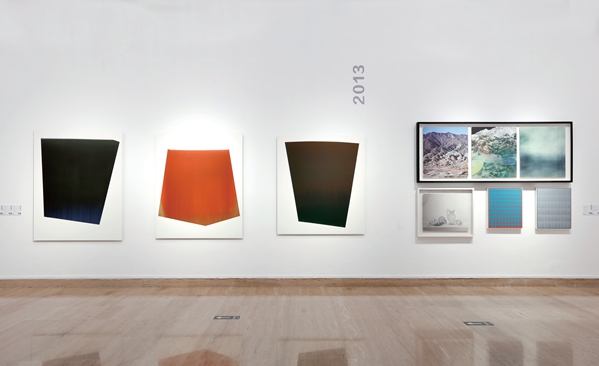
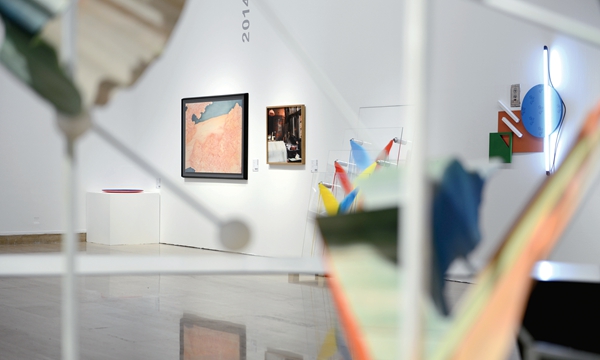
Two-Way Cultural Exchanges
This year marks the 60th anniversary of the establishment of diplomatic relations between China and France. It is also the Year of China-French Tourism and Culture. In 1964, France became the first major Western country (at the ambassadorial level) to establish formal diplomatic relations with China.
History of Yishu 8 — Residence of Chinese and French Artists, co-organized by Yishu 8 and China International Art Exhibition Company, opened on April 20 at the National Art Museum of China, in Beijing.
The event's purpose was to celebrate the 60th anniversary within the framework of the Year of China-French Tourism and Culture, and to commemorate the 15th anniversary of Yishu 8.
While discussing the role of cultural exchanges in China-France relations, Cayol says diplomatic relations are "the roof of the house," but, within the house, there should be encounters between people like artists, business leaders and students. She believes such human relationships make it possible to forge real ties between two countries.
Cayol believes, with joint efforts of the governments and people of both countries, the relationship between France and China will remain stable. She hopes people in both countries will have a more brilliant future.
"I believe, in the future, it will be necessary for both the French side and the Chinese side to maintain a mutual curiosity. I will continue to use Yishu 8 as a bridge to connect French artists with China, and to let Chinese artists truly understand France, thus achieving a two-way cultural exchange between China and France," Cayol says.
Photos from Christine Cayol
(Women of China English Monthly July 2024)
Editor: Wang Shasha
Please understand that womenofchina.cn,a non-profit, information-communication website, cannot reach every writer before using articles and images. For copyright issues, please contact us by emailing: website@womenofchina.cn. The articles published and opinions expressed on this website represent the opinions of writers and are not necessarily shared by womenofchina.cn.








.jpg)

 WeChat
WeChat Weibo
Weibo 京公网安备 11010102004314号
京公网安备 11010102004314号